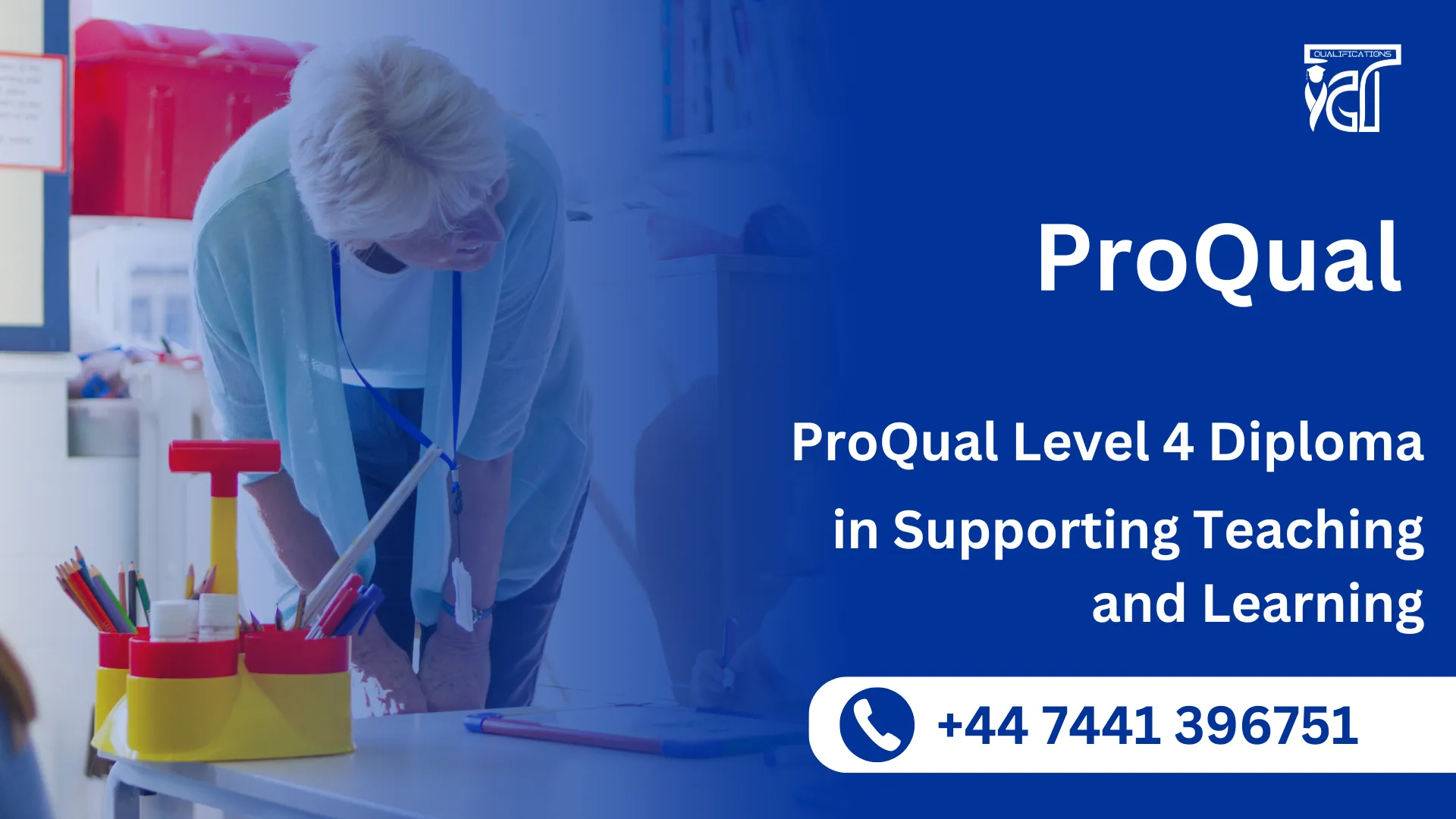The role of education support professionals has become increasingly significant in modern classrooms. Teaching assistants, learning mentors, and educational support staff play a crucial role in enhancing student learning experiences and ensuring the smooth functioning of educational institutions. The ProQual Level 4 Diploma in Supporting Teaching and Learning is a globally recognized, Ofqual-regulated qualification designed to equip individuals with advanced skills in supporting teaching and fostering an effective learning environment.
This diploma is particularly beneficial for those already working in educational settings or aspiring to take on more responsibilities in schools, colleges, or special education institutions. Unlike traditional courses, this qualification is entirely assignment-based, allowing learners to study at their own pace without the pressure of exams.
The ProQual Level 4 Diploma in Supporting Teaching and Learning is structured to develop a comprehensive understanding of educational principles, classroom management, student development, and inclusion strategies. This qualification is ideal for individuals looking to advance their careers in education by taking on leadership responsibilities, supporting learners with diverse needs, and contributing to curriculum planning.
By completing this diploma, learners gain a deep insight into child development, safeguarding policies, behavioral management techniques, and inclusive teaching practices. It provides a strong foundation for those looking to progress to higher-level teaching assistant roles, learning support positions, or even teacher training programs.
The ProQual Level 4 Diploma in Supporting Teaching and Learning is a highly valuable qualification for individuals looking to excel in education support roles. Whether you are an experienced teaching assistant or someone new to the field, this diploma provides the skills and knowledge required to support teaching staff, enhance student learning, and contribute to a positive educational environment.
ProQual Level 4 Diploma in Supporting Teaching and Learning
To achieve the ProQual Level 4 Diploma in Supporting Teaching and Learning: Candidates must complete all of the Mandatory units, plus a minimum of one optional unit.
| Unit Title |
|---|
| Study Skills |
| Legal requirements/legislation |
| Leadership and management |
| Class management and managing behaviour |
| Understanding child development and how children learn |
| Working in partnership |
| Support programmes that promote children’s development |
| Understanding lesson plans and schemes of work |
| Reflecting, reviewing and evaluating own practice |
Optional Units
| Unit Title |
|---|
| Learning mentor role |
| Family support worker role |
| Special Educational Needs and Disabilities |
| Developing and delivering own lesson plans |
| Speech language and communication |
| Use of technology |
| Social, emotional and mental health in children and young people |
GLH (Guided Learning Hours) and TQT (Total Qualification Time) are terms commonly used in vocational qualifications to help define the amount of time a learner is expected to spend on their studies.
1. GLH (Guided Learning Hours)
GLH refers to the number of hours a learner spends being directly taught, supervised, or supported during their course. This includes the time spent in activities such as:
- Classroom instruction
- Practical workshops
- One-on-one tutoring or mentoring sessions
- Online learning sessions with tutor support
In other words, GLH represents the time that learners are actively engaged with their instructors or learning activities.
2. TQT (Total Qualification Time)
TQT represents the total amount of time a learner is expected to invest in completing a qualification, including:
- GLH (Guided Learning Hours): Time spent on direct learning, as explained above.
- Self-Directed Learning: This includes time spent on independent study, research, assignment completion, preparation for exams, and any other work the learner does outside of direct teaching hours.
TQT is a broader measure that includes all the time required to achieve the qualification. It helps learners and employers understand the overall commitment required for the qualification.
Key Differences Between GLH and TQT:
- GLH focuses on direct learning with guidance or supervision.
- TQT includes GLH as well as independent study time and other learning-related activities.
Example:
If a qualification has a TQT of 600 hours and a GLH of 250 hours, it means the learner should spend 250 hours in direct learning (classroom, online, or tutor-led sessions) and 350 hours on independent study or research.
ProQual Level 4 Diploma in Supporting Teaching and Learning
M4:1 Study Skills (R/508/2786)
- Understand how to complete research for a specific topic/subject and present findings in an appropriate format
- Understand how to edit a piece of work to fit an assignment brief
- Understand how to prepare and present a report
M4:2 Legal Requirements/Legislation (M/617/6121)
- Understand the current legislative framework for Employment Rights in the home nation
- Understand the current legislative framework for safeguarding and welfare requirements for Early Years Foundation Stage, Child Protection and Looked After Children
- Understand how to support pupils in accordance with the Special Educational Needs Disability (SEND) Code of Practice
- Understand the policies and procedures relating to information gathering and monitoring, E-safety in the work setting
- Understand the requirements of, and how to prepare for, an Ofsted inspection
M4:3 Leadership and Management (T/617/6122)
- Understand the different styles/theories of leadership and management
- Understand effective team working, including team development and dealing with conflict
- Be able to work collaboratively and cooperatively with colleagues within the work setting
- Understand the purpose of professional supervision
M4:4 Class management and managing behaviour (A/617/6123)
- Understand how group dynamics and social organisation affect the learning process
- Understand how to effectively use behaviour management strategies to promote positive behavior
- Be able to supervise pupils effectively in line with setting’s behaviour policies and procedures
- Be able to organise and safely manage the learning environment
M4:5 Understanding Child Development and How Children Learn (J/508/2865)
- Understand the expected pattern of development and the factors that can have an impact on this pattern
- Understand theories of development and theoretical perspectives of children’s development and how they influence current practice
- Understand the possible effects transitions and significant events can have on children’s development
M4:6 Working in Partnership (F/617/6124)
- Understand partnership working
- Understand multi-agency working
M4:7 Support programmes that promote children’s development (J/617/6125)
- Understand different observation, evaluation and assessment methods used within their setting
- Understand how to evaluate pupil’s progress through a range of assessment activities
- Understand the effectiveness of programmes that support children’s development, including children requiring additional support
M4:8 Understanding Lesson Plans and Schemes of Work (L/617/6126)
- Understand the planning format/scheme of work used in work setting and how it relates to the national curriculum
- Be able to use teachers’ long/medium/ short planning for lesson plan/learning activities and understand the importance of including all children in learning activities, e.g. SEN, gifted and talented
- Be able to select and prepare resources to support the delivery of the lesson plan/learning activity
- Understand the marking scheme used in the work setting and relevant record keeping
M4:9 Reflecting, Reviewing and Evaluating Own Practice (R/508/2870)
- Understand what professional development is
- Be able to reflect on their own practice
- Be able to use reflective practice to plan professional development
- Be able to improve practice through reflection and professional development
O4:10 Learning Mentor Role (R/617/6127)
- Understand the role of learning mentor
- Be able to support children and young people to achieve identified targets
- Be able to develop and support a nurture group within their setting
- Understand and be able to provide support for teaching staff to achieve positive outcomes for children and young people
O4:11 Family Support Worker Role (Y/617/6128)
- Understand the role of the parent/family support worker
- Be able to work with parents effectively to improve outcomes for children and young people
- Understand the principles of working with a group of parents and be able to work effectively in a group environment
- Be able to work in partnership with school staff, parents and external professionals/agencies to create action plans to address attendance and/or behavioural issues
- Understand and be able to reflect on current practice and identify areas of strength and areas for development
O4:12 Special Educational Needs and Disabilities (D/617/6129)
- Understand the current legislation both nationally and in the work setting
- Understand SEN and the impact on the child, family and schools
- Demonstrate practice of working with SEN children including understanding and delivering of guidance from other professionals
O4:13 Developing and delivering own lesson plans (R/617/6130)
- Be able to construct own scheme of work and lesson plans
- Be able to implement own lesson plans
- Be able to evaluate delivery of own lesson plan
- Understand Bloom’s Taxonomy
O4:14 Speech, language and communication (Y/617/6131)
- Understand the various skills needed to communicate
- Understand the typical stages of language and communication development
- Understand and implement strategies to support children with speech, language and communication difficulties
O4:15 Use of Technology (D/617/6132)
- Understand current legislation, policies and procedures that deal with E-safety and the impact on children and young people
- Understand the variety of technology that is available and what is suitable for educational settings
- Be able to use technology to deliver a lesson plan and improve visual displays
O4:16 Social, Emotional and Mental Health in Children and Young People (H/617/6133)
- Understand current legislation, policies and procedures that deal with children’s and young people’s mental health
- Understand mental health and well-being in children
- Understand how to support children in an educational setting with mental health issues
Benefits of the ProQual Level 4 Diploma in Supporting Teaching and Learning
The ProQual Level 4 Diploma in Supporting Teaching and Learning offers numerous benefits for individuals looking to advance their careers in education. This Ofqual-regulated qualification provides in-depth knowledge and practical skills essential for supporting teaching and creating a positive learning environment. Below are the key benefits of this diploma:
1. Career Advancement Opportunities
- Qualifies individuals for senior teaching assistant, learning mentor, and education support roles.
- Enhances job prospects in schools, colleges, and special education settings.
- Serves as a stepping stone for those considering further studies in teaching or education leadership.
2. Ofqual-Regulated and Globally Recognized
- The diploma is Ofqual-regulated, ensuring high credibility and acceptance by employers.
- Recognized by schools and educational institutions across the UK and internationally.
3. Flexible, Assignment-Based Learning
- No exams – the course is entirely assignment-based, allowing learners to study at their own pace.
- Ideal for working professionals balancing their education with job responsibilities.
4. Comprehensive Understanding of Educational Support
- Covers child development, safeguarding policies, and classroom management strategies.
- Equips learners with advanced teaching support techniques to enhance student learning.
- Focuses on inclusive education, ensuring students with diverse needs receive adequate support.
5. Strong Focus on Safeguarding and Student Wellbeing
- Provides essential knowledge on safeguarding policies, health and safety regulations, and behavioral management.
- Prepares individuals to handle student welfare concerns effectively in educational settings.
6. Improved Student Support Skills
- Enables professionals to support students with special educational needs (SEN) and learning difficulties.
- Equips learners with strategies to assist in curriculum planning and classroom engagement.
7. Increased Professional Confidence and Responsibility
- Helps individuals take on greater leadership roles within educational settings.
- Provides the skills needed to mentor junior staff and contribute to curriculum development.
8. Eligibility for Higher-Level Teaching Roles
- Opens pathways to teaching assistant leadership positions.
- Supports career progression towards higher-level teaching qualifications or teacher training programs.
9. Practical Knowledge for Real-World Application
- Focuses on hands-on skills that can be applied immediately in classrooms.
- Ensures learners develop effective communication, problem-solving, and student engagement techniques.
The ProQual Level 4 Diploma in Supporting Teaching and Learning is designed for individuals who are passionate about education, student development, and classroom support. This qualification is ideal for those looking to enhance their teaching assistance skills and take on greater responsibilities in schools, colleges, and other educational settings.
1. Teaching Assistants Looking for Career Progression
- Ideal for Level 3 qualified teaching assistants aiming for senior or higher-level roles.
- Provides the skills required to mentor junior teaching assistants and take on leadership responsibilities.
2. Learning Support Assistants & Classroom Assistants
- Perfect for individuals supporting students in mainstream and special education settings.
- Enhances skills in student engagement, classroom management, and curriculum support.
3. Special Educational Needs (SEN) Assistants
- Beneficial for those working with students with disabilities or learning difficulties.
- Covers essential inclusive education strategies to provide effective learning support.
4. Aspiring Teachers and Future Educators
- A great starting point for individuals who wish to progress to full teacher training programs.
- Helps build foundational knowledge of child development, teaching strategies, and educational policies.
5. Education Support Workers & Learning Mentors
- Ideal for professionals working in schools, colleges, or community education programs.
- Develops skills in student mentoring, safeguarding, and academic support.
6. School Administrators and Educational Leaders
- Suitable for school staff involved in student welfare, curriculum planning, and classroom coordination.
- Provides a deeper understanding of education policies, student well-being, and staff management.
7. Childcare and Early Years Practitioners
- Beneficial for those working in nurseries, preschools, and early education centers.
- Enhances understanding of child development and learning support for younger students.
8. Career Changers Entering the Education Sector
- A great option for professionals transitioning from other industries into education and learning support.
- No prior teaching experience is required, making it accessible to newcomers in the field.
Entry Requirements
Register Now
Qualification Process
Qualification Process for the ProQual Level 4 Diploma in Supporting Teaching and Learning
- Self-Assessment:
Begin by evaluating your eligibility to ensure you meet the qualification requirements, including work experience, knowledge, and language proficiency. - Registration:
Complete your registration by submitting the required documents, including a scanned copy of a valid ID, and paying the registration fee. - Induction:
An assessor will conduct an induction to confirm your eligibility for the course and explain the evidence requirements. If you do not meet the criteria, your registration will be canceled, and the fee will be refunded. - Assignmnets & Evidence Submission:
Provide all assignmnets and the necessary evidence based on the assessment criteria outlined in the course. If you are unsure of the required evidence, consult with the assessor for guidance on the type and nature of evidence needed. - Feedback and Revision:
The assessor will review your submitted evidence and provide feedback. Evidence that meets the criteria will be marked as “Criteria Met,” while any gaps will be identified. You will be asked to revise and resubmit if needed. - Competence Evidence:
Submit final evidence demonstrating that all learning outcomes have been met. This evidence will be marked as “Criteria Met” by the assessor once it is satisfactory. - Internal Quality Assurance (IQA):
The Internal Quality Assurance Verifier (IQA) will review your evidence to ensure consistency, quality, and compliance with standards. - External Verification:
The IQA will submit your portfolio to ProQual’s External Quality Assurance Verifiers (EQA) for final confirmation. The EQA may contact you directly to verify the authenticity of your evidence. - Certification:
Upon successful completion of all checks, ProQual will issue your official certificate, confirming that you have attained the ProQual Level 4 Diploma in Supporting Teaching and Learning.







